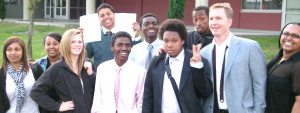Civics Builds Meaningful School to Family/Community Connections
CIVICS FOR ALL: STUDENTS, SCHOOLS, AND PARENTS LEARNING/ENGAGING TOGETHER!!!!!!
- In civics centric classrooms and schools, parents become easily and actively engaged in the learning process as students are encouraged to engage with their parents each fall on the various initiatives, ballot measures, and elections.
- With an annual autumn focus on elections, current issues, and electoral races, Civics for All will help cultivate citizens with a life long passion for learning, civic engagement, and, hopefully, public service.
- Each election cycle offers individual teachers and schools to invite parents and community members to the schoolhouse to participate in innumerable ways in the democratic process, including:
- Organizing and running elections and actual balloting with age -appropriate voting materials and ballots providing by our $250,000 King County Elections Grant
- Invitations to guest speakers, including local reps., senators, council-members, etc.
- Organizing Petition Drives of support for various initiatives and candidates, etc.
- Poster and pamphlet projects
- Integrating parents into the school fabric gives them opportunities to:
- share knowledge about democratic processes and opinions on issues
- learn about democratic processes and traditions
- Integrating parents into the school fabric gives them opportunities to:
- Each election cycle offers individual teachers and schools to invite parents and community members to the schoolhouse to participate in innumerable ways in the democratic process, including:
- Good civics centric classrooms and schools challenge our young citizen-scholars to develop their critical thinking skills and to develop their own vision of the role that they and their government should take in confronting the opportunities and problems of their local, national, and international communities.
- Literacy and math alone won’t solve our problems:
- The American Enterprise Institute recently announced that civic literacy is just as critical to success as mathematics and literacy, according to the findings of a massive ten paper research effort on civics education published in November 2012 by the Harvard Press.
- Literacy and math alone won’t solve our problems:
- Great civics schools extend that challenge of engagement to the family and the community with our student/scholars as the honorary liasons between the schoolhouse and their families.
- Students and parents learn together via a multiplicity of assignment options, including: parent and relative interviews, voter registration activities, media literacy assignments (e.g. comparing political biases on Fox News’ and MSNBC’s coverage of events/candidates), guest speaker “Parent Days” before elections, etc.
- Education is a community endeavor and it works best when students, teachers, and parents all learn together!!!
Civics brings communities together
- Civics for All will transform K-12 schools into “civic cultures,” where academic achievement and civic activism soar in tandem.
- Civics for All promotes wrapping anti-bullying initiatives and curricula into a civics framework.
- Well-crafted, politically non-partisan civics lessons build bridges of truth, honesty, and tolerance between races, ethnicities, classes, and political viewpoints. And, civic debates and discussions bring families together in the great American democratic tradition of dialogue and debate.
- Civics/Service Learning instruction increases civic engagement: students are more likely to contribute actively to their communities and vote 15 years later.
- Civics for All makes students and classrooms come alive — and teachers thrive — with civics-based lessons. As the teaching profession is revitalized, openness and collective productivity will transform our school cultures.
- Public relations – big civics push would be good PR for the District.
- lassroom connections that emphasize media literacy (video, digital, etc.) increase K-12 student interest and pedagogical efficacy.
- Civic life, politics, and social media are now inextricably intertwined for teens, according to the Pew Research Center. Isn’t it time our curricula reflected this reality and taught all students to master these connections?
Civics links the classroom to the living room! Civics lessons naturally connect students’ learning with parents and families!
- Civics for All makes school relevant by leveraging connections between required course content and civics, politics, current events and media literacy. Media literacy offers easy opportunities for youth and parents to critically watch TV news programming together, read the paper together, and simply discuss issues
- Civics lessons create multiple, interlocking positive feedback loops between:
- Academics and self-esteem
- Students and teachers
- Students and parents
- Families and schools
Seattle’s Major Parent/Community Organizations Support the Civics for All Vision:
Including: Madison Middle School PTSA (Unanimous endorsement), City Year, Community & Parents for Public Schools of Seattle, PugetSoundOff.org, Parents Across America (Seattle), the PTSA (Seattle), Stand for Children Washington, the Alliance for Education, the Seattle Alliance of Black School Educators, the League of Women Voters, and others.
Why Do Parent/Community Groups Support Civics for All?
Main Reasons:
- Civics education helps kids succeed in school
- Civics education strengthens family relationships
- Civics education strengthens community relationships
Main Reasons Explained:
- Civics education helps kids succeed in school:
- The evidence for this truism is overwhelming.
- On the Civics for All website civicsforall.org there are tons of links to research that shows all kids do better in school when civics topics and perspectives are infused into class studies.
- Civics helps brings RELEVANCE AND RECOGNIZABLE CONNECTIONS AND MEANINGFULNESS TO class-work that helps spark student interest.
- Civics lessons helps students “individuate” and develop their own “civic identity” and sense of individuality because dealing with complex questions of civics/politics/ethics does that
- As students’ pride in their civic identity grows so does their self esteem, and when self-esteem earned through real thinking increases they tend to do even more homework
- This “positive feedback loop” is the reason students in civics-based classes tend to perform at such high levels
Civics education strengthens family relationships around meaningful discussions
- Parents are dying to get a response when they ask “how was school today” or “what did you study today?”
- Civics taught kids have something that they want to share more often than not, because of the relevance of civics lessons
- As students learn more about the connections between civics and politics discussions at home can become explosively wonderful!
- When teachers require students, through assigned homework, to discuss the issues of the day it can be great
- Voting every fall offers a great way for families to come together around the most fundamental act of democratic citizenship
- Students often end up educating, and sometimes registering, their parents about the political process
- Parents often get caught up in their children’s enthusiasm for politics.
- Families become a place where students can and usually want to practice the communication skills and ideas that they learned in school
- Media literacy, especially related to electoral and every day politics, becomes a HUGE OPPORTUNITY FOR FAMILIES to watch TV together as critical viewers – watching and comparing Fox News and MSNBC is always a great way to spark discussion
- The study of civics and the media builds a bridge between the classroom and the living room
Civics education strengthens community relationship
- The study of civics teaches young people how to get along with others and about the value of relationships
- The close study of democratic principles, values, and ideals helps kids mature and become more sensitive and tolerant towards others at school and in the neighborhood
- The study of problem-solving and conflict-resolution methods in civics lessons helps kids learn how to resolve and minimize conflict in the neighborhood, and at home
- Civics teaches kids their rights AND THEIR DUTIES to the community – this is very beneficial (esp. if a parent needs the lawn mowed or the trash taken out!)
- Civics lessons often incorporate service-learning activities that seek to improve life and solve problems in the immediate community
This website is designed as a Common Resource for Seattle civics-education boosters and as a model for educators in schools and districts across the country who would like to adopt the approach or elements of it.





